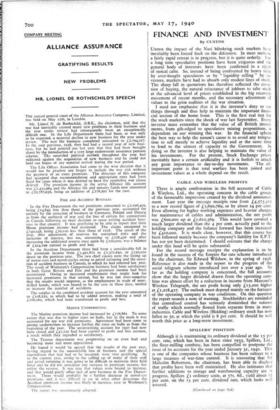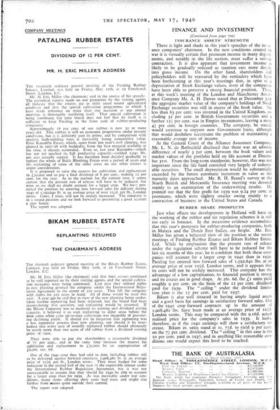FINANCE AND INVESTMENT
By CUSTOS
UNDER the impact of the Nazi blitzkrieg stock markets have inevitably been forced back on the defensive. In most sectiens a fairly rapid retreat is in progress, but it is quite orderly. For a long time speculative positions have been exiguous and the general body of investors have been confirmed in a Sipirt of stoical calm. So, instead of being confronted by heavy sales by over-bought speculators or by "liquidity selling" by in- vestors, markets have had to absorb only modest lines of stock. The sharp fall in quotations has therefore reflected the cessa- tion of buying, the natural reluctance of jobbers to take stock at the advanced level of prices established in the big recovery movement of recent months, and the necessary adjustment of values to the grim realities of the war situation.
I need not emphasise that it is the investor's duty to see things through and thus help to maintain the important finan- cial section of the home front. This is the first real test for the stock markets since the shock of war last September. Every investor must remember that the value of all British invest- ments, from gilt-edged to speculative mining propositions, is dependent on our winning this war. In the financial sphere the best way to help the nation's cause is to avoid any tempta- tion to sell merely to achieve liquidity and at the same time to lend to the utmost of capacity to the Government. In doing so the investor is also helping to maintain the value of his investments. For the present, Stock Exchange prices inevitably have a certain artificiality and it is foolish to attach any great importance to day-to-day movements. The all- important point is that total warfare has been joined and investment values as a whole depend on the result.
CABLE AND WIRELESS PROFITS
There is ample confirmation in the full accounts of Cable & Wireless, Ltd., the operating concern in the cable group, of the favourable impression created by the dividend announce- ment Last year the message receipts rose from £4,573,315 to a new record figure of £5,690,769, or by about 24 per cent. Even allowing for higher working expenses and heavier charges for maintenance of cables and administration, the net profit was £600,00o up at £1,610,369. This would have covered a much larger dividend than the 4 per cent. actually paid to the holding company and the balance forward has been increased by £410,000. It is made clear, however, that this course has been followed mainly because the company's liability for E.P.T. has not yet been determined. I should estimate that the charge under this head will be quite substantial.
For the record message receipts the explanation is to be found in the success of the Empire flat rate scheme introduced by the chairman, Sir Edward Wilshaw, in the spring of 1938. Reference is also made in the report to the progress of the social telegram scheme introduced just over a year ago. So far as the holding company is concerned, the full accounts show that the larger dividend drawn from the operating com- bine was almost offset by a reduction in income from Marconi's Wireless Telegraph, the net profit being only £15,000 higher at £1,218,427. The outlook must depend mainly on the fortunes of the operating company in war conditions. On this question the report sounds a note of warning. Stockholders are reminded that centralised control has seriously diminished the volume of traffic which normally flowed from separate firms in many industries. Cable and Wireless (Holding) ordinary stock has now fallen to 50, at which the yield is 8 per cent. It should be well worth this price as a long-term investment.
SPILLERS' POSITION
Although it is maintaining its ordinary dividend at the 15 per cent. rate, which has been in force since 1933, Spillers, Ltd., the flour-milling combine, has been compelled to postpone the issue of its accounts for the year ended January 31, 1940. This is one of the companies whose business has been subject to a large measure of war-time control. It is reassuring that Sir Malcolm Robertson, the chairman, has been able to disclose that profits have been well maintained. He also intimates that further additions to storage and warehousing capacity are in progress. Spillers Li ordinary units, at 575. 6d. yield about 51 per cent. on the 15 per cent. dividend rate, Which looks wog assured.
(Continued on page 702)
FINANCE AND INVESTMENT
(Continued from page 700) INSURANCE ASSETS' STRENGTH There is light and shade in this year's speeches of the in- ance companies' chairmen. In the new conditions created us, war it is virtually certain that premium income in many depart- ments, and notably in the life section, must suffer a serious contraction. It is also apparent that investment income is likely to be gradually reduced as taxation eats more deeply into gross income On the other hand, shareholders and policyholders will be reassured by the reminders which have been forthcoming at this year's meetings that, in spite of a depreciation of Stock Exchange values, most of the companies have been able to preserve a strong financial position. Thus, at this week's meeting of the London and Manchester Assur- ance Company Mr. A. H Dawes stated that at December 31st the aggregate market value of the company's holdings of Stock Exchange securities was still in excess of the book value. No less than 83 per cent. was invested in the United Kingdom, in- cluding 32 per cent. in British Government securities and a further 124: per cent. was in Empire investments, leaving a mere 41 per cent. in foreign countries. The company, he stated, would continue to support new Government loans, although that would doubtless accentuate the problem of maintaining a reasonable average rate of income.
At the General Court of the Alliance Assurance Company, Mr. L. N. de .Rothschild disclosed that there was an adverse difference of nearly 3 per cent. between the book values and market values of the portfolio held on life account at Decem- ber 3i st. From the long-term standpoint, however, this was not important since the life fund consisted very largely of redeem- able securities. The small depreciation would be substantially exceeded by the future automatic increment in value as the maturity dates approached. Mr. R. H. Brand's survey at the North British and Mercantile Insurance meeting was devoted mainly to an examination of the underwriting results. He pointed out that the fine profit for 1939 was 9.24 per cent. of premiums, which were slightly smaller owing mainly to a contraction of business in the United States and Canada.
RUBBER SHARE PROSPECTS
Just what effects me developments in Holland will have on the working of the rubber and tin regulation schemes it is still too early to forecast. In the meantime evidence accumulates that this year's prospects for rubber-producing companies, both in Malaya and the Dutch East Indies, are bright. . Mr. Eric Miller has given a balanced view of the position at the recent meetings of Pataling Rubber Estates and Bikam Rubber Estate. Ltd. While he emphasises that the present rate of release under the regulation scheme will have to be reduced for the last six months of this year, he is confident that both these com- panies will account for a larger crop in 1940 than in 1939. Pataling has entered into forward sales of 1,592,640 lbs. at an average price of over joid. London terms, and it appears that its costs will not be unduly increased. This company has the advantage of a low capitalisation, its financial position is strong and its estates are in good shape. At 26s. 6d. the LI units yield roughly 9 per cent. on the basis of the 12 per cent. dividend paid for 1939. The " ceiling " under the dividend limita- tion plan is the 15 per cent. paid for 1937.
Bikam is also well situated in having ample liquid assets and a good basis for earnings in satisfactory forward sales. Out of the 1940 crop forward contracts up to the amount of 1,908,480 lbs. have been made at an average price of told. London terms, This may be compared with the 9.16d. actual realised price for the company's sales in 1939. It looks, therefore, as if the 1940 earnings will show a satisfactory in- crease. 'Bikam 2S. units stand at is. 71c1. to yield 9 per cent. on the /3: per cent. dividend. The-" ceiling" in this case is the to per cent. paid in 1937, and in anything like reasonable con- ditions one would expect this level to be reached.



































 Previous page
Previous page